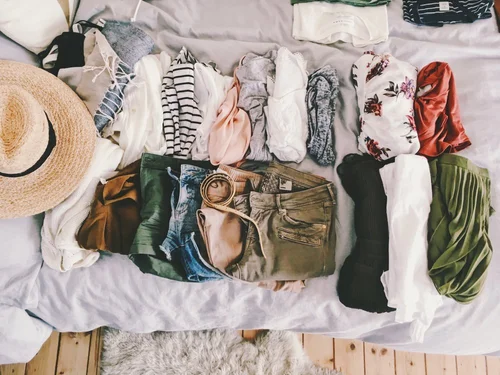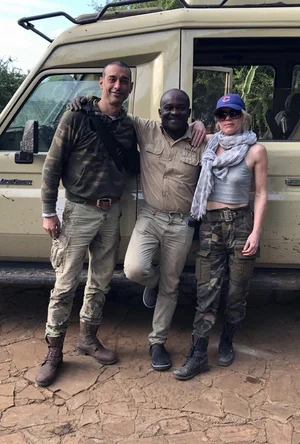Not to worry, as we’ve put together this general rundown of what you should definitely include in your travel bags when visiting Africa and what it means to pack for a purpose.

CLOTHING
Apart from selecting reasonably neutral or ‘non-bright’ colored clothing, safari-wear is generally casual and practical. Be sure you take clothes that you feel comfortable in – especially when it comes to walking shoes. Newer quick-drying fabrics, shirts with ventilation and trousers that convert into shorts are all worth considering. Wearing clothes in layers is the most practical way to cope with fluctuating day/night temperatures and cool evenings. As the day warms up you can peel off another layer. Then as it begins to cool toward evening, you can put them back on.
Starting from the bottom, you’ll want to pack at least one pair of sturdy, but comfy shoes. Open-toe sandals and flip flops suffice while you’re in the safari vehicle or at the camp, but you’ll definitely need sturdy shoes/sneakers when you’re out and about in the wild and at night (to avoid mosquito bites).
For the actual clothes, you’ll want to choose lightweight, moisture-wicking materials, preferably in khaki or natural colors that make you blend in with the environment. This is because overly bright colors can cause you to stand out in the bush and may irritate the animals, while dark colors like blue and black attract tsetse flies and other bugs, and an encounter with them can cast a slight pall on your safari experience. Bring a mix of t-shirts and shorts as well as long-sleeved shirts and long pants for different weather situations. Early mornings and late nights can get quite chilly so don't forget to pack a lightweight jacket or a warm sweater/hoodie. Other items to consider include wide-brimmed hats for when you’ll be out on game drives. Bring your swim wear if you will stay at hotels or lodges that have a pool, or are planning a visit to the beaches of Zanzibar after your safari.
Check the weather: ask us at Sababu Safaris (or check online) and find out what the weather will be like where you are going. You may not need any serious cold weather gear at all (and that will really help with the luggage limit!). Alternatively, if you are going to visit Tanzania in the dry season when temperatures drop dramatically once the sun goes down, you may need a scarf, a thick jacket and even a beanie. Certain spots in the Serengeti and the Ngorongoro Conservation area can become very cold in the early mornings and late evenings during the dry season/winter months (June through October).
YOUR LUGGAGE
Due to weight restrictions, it’s important that you utilize the space available efficiently and look for ways to reduce the total weight of your luggage. For instance, we recommend opting for a lightweight, spacious duffel bag instead of a regular suitcase with wheels. It is important to know that hard shell suitcases are not allowed on most domestic flights in Tanzania. For your carry on, don’t forget to pack any medications and other essential items just in case your checked bag is lost or delayed by the airline.
Don’t panic about limited space! Same-day laundry service is usually available at most safari camps and lodges. This means you do not need a change of clothes for each day you are on safari! The exception will be for some mobile tented camps where it is often difficult to offer laundry service. It may also be possible to leave a bag with the charter company, or the person meeting you, for the duration of the safari portion. When in doubt, ask us at Sababu Safaris.
SAFARI GEAR
Africa is a photographer’s dream. Not only does the boundless wildlife come in all shapes and sizes, but the continent is also blessed with stunning landscapes, colorful people and fabulous light! Don’t miss out. Buy a camera, if you don’t already have one. If you want to bring your phone and music, do not forget to bring chargers and country-specific adaptor plugs (UK sockets are used in Tanzania). All our safari vehicles have charging outlets so you will be able to keep them charged at all times. However, we encourage you to try to leave your tablet and laptop at home – they can be a distraction from your beautiful surroundings.
Sababu Safaris provides binoculars in each safari vehicle but feel free to bring your own as well, if you like! Binoculars are essential for optimum wildlife viewing on safari (and a good pair of binoculars will make a big difference to your safari).
You’ll also need to bring along a functional bag where you can store your gear and be able to access it quickly. Other essential gears include extras for your camera (batteries, memory cards, lens cleaners, etc). Most camps and lodges will provide a flashlight, and will walk you back to your tent at night as required, but being self-sufficient is always a good idea (usually the flash light on your mobile phone is sufficient as well).
SELF-CARE
Items for self-care include sunscreen, lip balm, polarized sunglasses, medication, personal toiletries and any other items that you may need, like a small first aid kit and hand sanitizer.
If you wear prescription glasses, be sure to pack more than one set (in case you lose one or they get broken). You will be outdoors for much of the time, so be prepared. If you wear contact lenses, definitely bring glasses, too, because it can get dusty!
Just in case the worst happens, consider bringing the following medication: diarrhea and indigestion medicine, pain killers, heartburn medicine; insect repellent, antihistamine (for allergic reactions against bug bites), throat drops (lozenges), eye drops, and most important – anti-malarial tablets.
It is also recommended to bring some cash for tipping the lodges and camps you will be staying at as well as your guide, and for purchasing gifts and souvenirs during cultural visits to local markets, for example.
PACKING FOR A PURPOSE
While it is vital to know what to pack, it is also equally important to understand that you don’t have to just pack for yourself alone. Most airlines allow you to check two full bags (23kg each), so we encourage you to bring a few useful items that some people of Tanzania might not have access to. This is what it means to Pack for a Purpose. Not only does it benefit the local community without adding a burden to you, but it also helps fulfill one of the tenets of responsible and sustainable travel. Families can use this as an opportunity to teach their children a valuable lesson while being on a holiday: it's not only all about making this trip fun for yourself but “giving back” can add a lot of value to your trip.
Packing for a purpose is growing in popularity and local tour operators such as ourselves at Sababu Safaris have seized on the initiative as a way of using travel to create a lasting impact among local communities in Tanzania. If you’re interested in packing for a purpose, you could bring along general school supplies (school bags, books, pencils/pens and educational games, among others). Other helpful items that you could include in your travel bags are art supplies, sports equipment like spring ropes or soccer balls, first aid materials, and office supplies for the teachers.
Nowadays, traveling should be more than just experiencing the thrill of a new destination but also making an impact. Packing for a purpose is a good way to achieve this. Why not give it a go for your next trip?
A WORD (OR TWO) OF WARNING
It is not advisable to wear any form of clothing that may be construed as “camouflage”. By this we mean any form of brown/green “combat” style coloring. Even if it is the latest fashion statement - and even if it is your 14 year old wearing it - and even if it is just a cap. Many African authorities have a disproportionate phobia of such garments and this could conceivably result in you being questioned or harassed by the police. It has the potential to cause you grief, so don’t do it.
Do not take any expensive personal jewelry on safari. Be minimalist or take only those everyday items that you normally wear, like your wedding band, inexpensive earrings.
With regard to securing your luggage, we would strongly suggest using a combination lock to secure zips together if your suitcase does not have its own locking mechanism. Luggage tampering in airports does occur, unfortunately. Luggage straps that wrap around your suitcase can also deter, whilst shrink-wrapping facilities are available at some airports. Most lodges and camps have a safe in the rooms…and if not, these combination locks on your suitcase will keep your valuables safe.
Original source: Sababu Safaris




